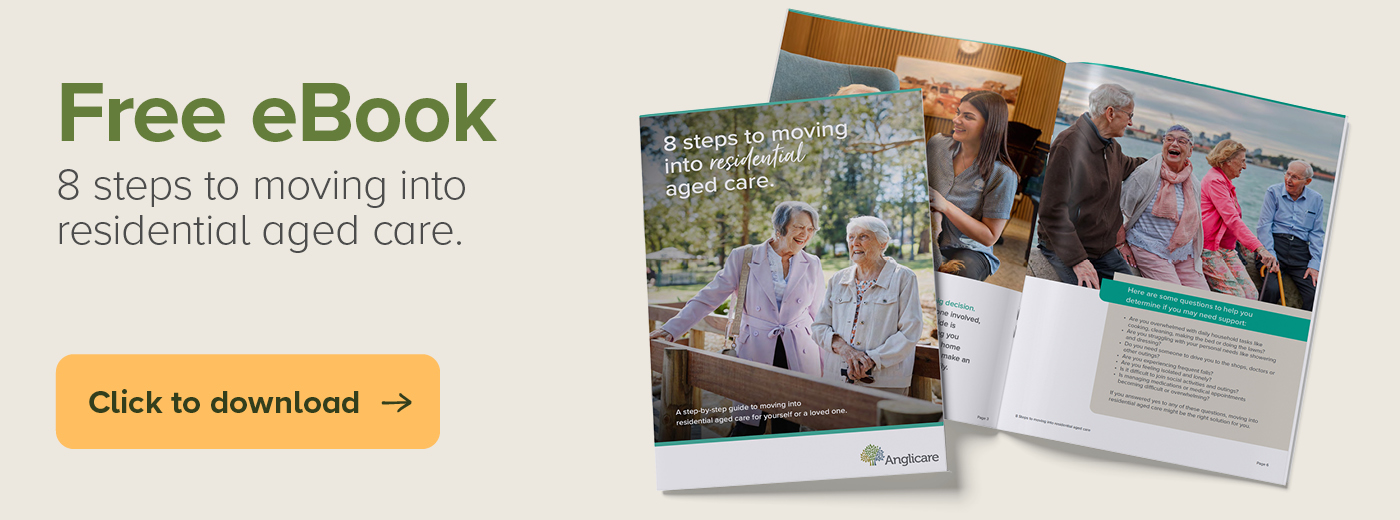Maintaining independence after moving into residential aged care
For many Australians, losing independence is one of the biggest concerns when it comes to moving into residential aged care. But you may be surprised to discover this isn’t the case.
For years, the days had followed a familiar, comforting pattern. Tea in the morning, made just the way she liked. A few peaceful hours tending to the garden. Tidying this, moving that. Keeping busy in a house she knew like the back of her hand. Checking the mailbox (even if there wasn’t much in it).
There was nothing out of the ordinary about the routine, but it was hers. It gave shape and meaning to the day. A sense of comfort, and a sense of self.
This story isn’t unique. Lots of people live like this.
That’s why, when moving into residential aged care comes up in conversation, the first concern for many isn’t about the care itself, but about independence.
According to the Catalyst Residential Aged Care Study 2024, seven in ten Australians say they’re discouraged from residential aged care because they want to stay independent. People talk about missing their gardens, their pets, or the ability to potter around and do things on their own terms.
But what doesn’t get talked about enough is how that sense of independence doesn’t necessarily disappear. In many homes, it just starts to look a little different.
Life doesn’t stop being yours
There’s a common idea that moving into residential aged care means losing control. But for many people, it becomes a place to rediscover choice.
That might mean choosing how you spend your morning, whether that be watering the garden, playing the piano after lunch, helping plan a group activity or contributing to your new community.
At Goodhew Gardens, an Anglicare residential aged care home in Taren Point, Wayne has continued to maintain his independence and a sense of agency over his time through something simple: delivering the newspaper.
Each morning, he makes his way through the halls, dropping off papers and stopping for a chat. Some days, it takes him an hour. Not because of the distance, but because of the conversations.
“I find it fulfilling and rewarding,” he says. Wayne is part of ResiAction ®, a program that provides residents with the opportunity to take on small roles around their home, like greeting guests at reception, tending to the garden, running the library, or setting the tables.
At its core, ResiAction recognises many people still have something to give, creating space for residents to contribute in ways that feel right for them.
Click below to watch the video


Independence doesn’t mean doing everything alone
You may be concerned that after moving into residential aged care, you could start to lose what makes you, you. However, you’ll be pleased to know that inside many homes, the reality is very different.
You may find someone playing piano in the lounge after lunch, just because they love it. Another resident knitting blankets to raise money for a local charity. People helping set up for the day’s activities or sitting with someone new to make sure they feel welcome.
Some of these moments are part of the daily schedule, but many aren’t. They’re simply people doing what feels natural, staying busy in ways that feel good, familiar and meaningful, while being part of a community again.
They might be small, ordinary things, but they’re also sacred. Because they remind residents they still matter, they still have a choice, and they still have something of value to contribute.
At Anglicare residential homes across NSW, this kind of independence plays out every day. And while the decision to move in isn’t always easy, many residents find that over time, with familiar routines and new relationships, a different kind of freedom returns. A sense of belonging. A new rhythm of life that feels like their own.
A new kind of independence
If you're considering residential aged care, either for yourself or someone close to you, it’s okay to feel uncertain. It’s okay to feel grief, or guilt, or even relief. These transitions are layered.
Here’s what’s important to know: quality residential aged care doesn’t take away your independence – it supports it, in a new way. With the right care, residents can keep doing the things they enjoy, make their own choices, and find love, joy and connection in daily life. While moving into residential aged care is a significant change, it’s also a new and exciting chapter.
So, how can you maintain independence in residential aged care? Often, in the same way you always have. Saying good morning to someone who knows your name. Watering the herbs outside the dining room. Continuing a hobby you’ve always loved, picking up something you haven’t done in years, or discovering something new entirely.
You might not know what to expect at first. But day by day you’ll settle in. You’ll find your rhythm again. And with it, a sense of independence that feels like you.
Curious about what life in an Anglicare residential aged care really looks like?
Explore Anglicare's residential aged care homes to hear real stories from residents and staff. To stay up to date with what residents are up to, follow them on Instagram and Facebook.
Enquiries
Our team of caring consultants are looking forward to assisting you navigate residential aged care. We understand it can be overwhelming, and it is a time of change and transition for everyone involved. If your need is urgent you may prefer to call 1300 111 278.
If you are interested in Support at Home - please click here.
If you are interested in Aged Care Jobs - please click here.
For residential aged care enquiries please use the form below.
Enquire here


Inspired by the gospel of reconciliation in Jesus Christ, Anglicare's vision for reconciliation is a nation in which Australia's First Peoples are restored in dignity, respect, empowerment and opportunity.



